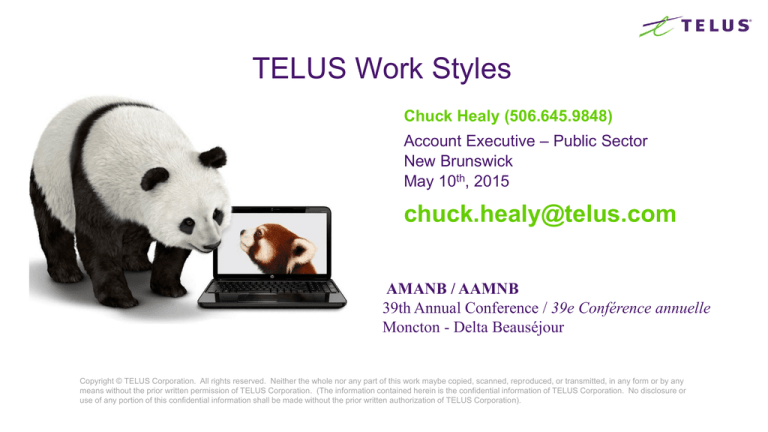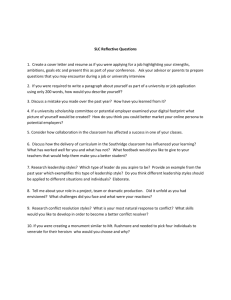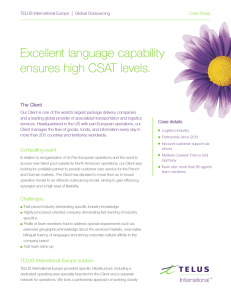
TELUS Work Styles
Chuck Healy (506.645.9848)
Account Executive – Public Sector
New Brunswick
May 10th, 2015
chuck.healy@telus.com
AMANB / AAMNB
39th Annual Conference / 39e Conférence annuelle
Moncton - Delta Beauséjour
Copyright © TELUS Corporation. All rights reserved. Neither the whole nor any part of this work maybe copied, scanned, reproduced, or transmitted, in any form or by any
means without the prior written permission of TELUS Corporation. (The information contained herein is the confidential information of TELUS Corporation. No disclosure or
use of any portion of this confidential information shall be made without the prior written authorization of TELUS Corporation).
Agenda
Strategic intent for TELUS
Work Styles
1
2
3
Our Work Styles evolution
What we learned
Trend: a changing workforce and workplace
“The Canadian mobile
worker population is
set to increase from
12.1M in 2012,
accounting for 68.9%
of employed
Canadians, to 13.3M
in 2016 or 73% of the
workforce.”
Source: IDC’s Canada’s
Canadian Mobile Worker
2012 – 2016 Forecast
Our strategic intent
Work Styles® gives our team
members the flexibility to work
when and where they are most
effective so they can focus on
supporting an exceptional
customer experience.
Resident
Mobile
At-home
Foundation for Work Styles
Strong Customers First commitment
High team member engagement
Strong performance development process
Established Work Styles technology roadmap
Feedback for continuous improvement
Customers
First
Engagement
Performance
development
Technology
Feedback
Shift towards Work Styles culture at TELUS
Evolution of Work Styles at TELUS
TELUS Example
2015+
2014
Business as usual
and focus on further
adoption
Business ownership for Work Styles
2012-2013
2010-2011
2007-2009
2006
The project rollout continued
Governance model created focusing on obtaining
feedback and deploying improvements
Consolidation in major centres completed
The Work Styles program and the Real Estate strategy blend
National policy launched
Scope and target are solidified.
Technology maturing, competitive demands increasing. Challenge –
no guiding policy, inconsistent application
Introduction of Work Styles concept
Strengthening the cultural foundation
Our goal for 2015
Resident
30%
Mobile or
At-home
70%
Targets apply to team members across 14 buildings in major cities. (~15K)
Benefits of a flexible work environment
Return on
investment
Return on
employees
Return on
environment
Financial, Social and Environmental
Financial, social and environmental benefits to TELUS
Return on investment
Projected net cash flow savings of $166 million over 20 years from ongoing real estate
consolidation and optimization
Projected net cash flow savings/avoidance of $63.5 million over 13 years from our
investment in collaborative technologies (incl. Telepresence) and reduction in travel
Team members
Increased employee engagement scores from 53% to 85% over 7 years
Work Styles program satisfaction rate of 95% at the end of 2014
Environment
5640 Tonnes CO2e avoided in 2014
22.7 million km & 1.3 million hours in commuting saved
We continue to strengthen our employer brand
Quarterly new hire survey reports show Work-Life Flexibility to consistently
be a talent attractor for TELUS.
TOP
TOP
5
…reason why
applicants accepted
the TELUS Offer
Work-Life
Flexibility
Source: TELUS 2014
New Hire Surveys
(n=1525)
3
…factor applicants found
unique or different about
TELUS compared to
other companies
Our technology enables productive work behaviors
No matter where we work, the technology
that TELUS provides helps employees:
Strongly agree/agree
Perform work to a higher degree of quality
More efficiently complete work
Effectively collaborate with others
Be more productive
Holding ourselves to a higher standard
34.6%
100%
75%
45.5%
50%
25%
39%
34.6%
2012 industry
average
2014 Q3 TELUS
0%
Technology didn’t solve our
challenges, it enabled us to
solve our challenges.
Validating the effect of Work Styles on productivity
TELUS Work Styles is proven to:
Support
work-life balance
Improve
employee retention
Deliver consistent
productivity
Source: TELUS-Ivey Work Styles Study, 2014
What we have learned
Seek stakeholder engagement early in the
process - senior executives, enabling units,
business leaders
Validate role fit; Work Styles is a privilege for
team members not a right
Communicate transparently and ensure strong
change management
Seek continuous feedback - engage leaders
and team members on issues and actions to
improve
Create a governance program – embed Work
Styles into all people programs
Real Estate
IT
HR
Finance
Sharing our Work Styles success with others
Leadership
• Are your employees
empowered to
make decisions?
Flexible Work Styles
have multi-faceted
requirements
• Do you have the
leadership and
culture to support
teams when
employees start to
work in different
locations?
Digital
Readiness
• Is your organization
able to support
diverse learning
styles,
demographics and
geographical
locations?
• Do your employees
understand not only
how to collaborate,
but when to use
specific tools and
why?
Technologies
• Do you have the
hardware and
technology required
to provide secure
flexible work
options?
• Do leaders role
model the right
behaviours to
promote new
technologies and
support adoption
across your
organization?
Focus areas
Introducing the TELUS Transformation Office (TTO)
Digital Readiness &
Connected Learning
Service areas
Leadership &
Organizational Change
Strategic Planning
Workshops
Pilot Support
Flexible Work
Styles
Consulting Services
Web: www.telustransformationoffice.com
How can TELUS help specific to Work Styles?
1.
Strategic planning – where are you at now/where should
you be
2.
Planning & implementation workshops
3.
Technology solutions
4.
Organizational and personnel change management
practices
5.
Toolkits & adoption collateral
Flexible
Work Styles
Questions?
Chuck Healy (506.645.9848)
chuck.healy@telus.com
telus.com/workstyles




